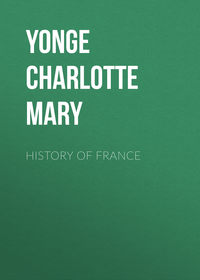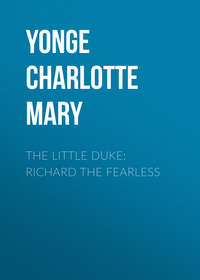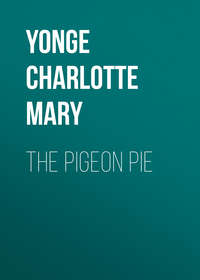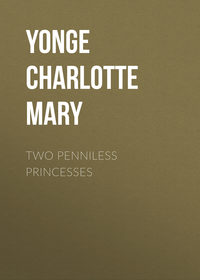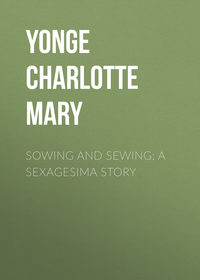
Unknown to History: A Story of the Captivity of Mary of Scotland
"In the Pleasance, father! Oh, stop them! They will slay one another! They had their swords!" and as the father was already gone, she threw herself into the mother's arms, hid her face and sobbed with fright as scarce became a princess for whom swords were for the first time crossed. "Fear not! Father will stop them," said the mother, with confidence she could only keep up outwardly by the inward cry, "God protect my boy. Father will come ere they can hurt one another."
"But how came it about?" she added, as with an arm round the trembling girl, she moved anxiously forward to know the issue.
"Oh! I know not. 'Twas Humfrey fell on him. Hark!"
"'Tis father's voice," said Susan. "Thank God! I know by the sound no harm is done! But how was it, child?"
Cis told with more coherence now, but the tears in her eyes and colour deepening: "I was taking in Humfrey's kerchiefs from the bleaching on the grass, when Master Babington—he had brought me a plume of pheasant's feathers from the hunting, and he began. O mother, is it sooth? He said my Lord had sent him."
"That is true, my child, but you know we have no choice but to refuse thee."
"Ay, mother, and Antony knows."
"Not thy true birth, child?"
"Not that, but the other story. So he began to say that if I were favourable—Mother, do men always do like that?" Hiding her face against the trusty breast, "And when I drew back, and said I could not and would not hearken to such folly—"
"That was well, dear child."
"He would have it that I should have to hear him, and he went down on his knee, and snatched at my hand. And therewith came a great howl of rage like an angry lion, and Humfrey bounded right over the sweetbrier fence, and cried out, 'Off, fellow! No Papist traitor knave shall meddle with her.' And then Antony gave him back the lie for calling him traitor, and they drew their swords, and I ran away to call father, but oh! mother, I heard them clash!" and she shuddered again.
"See," said Susan, as they had reached the corner of a thick screen of yew-trees, "all is safe. There they stand, and father between them speaking to them. No, we will not go nearer, since we know that it is well with them. Men deal with each other better out of women's earshot. Ah, see, there they are giving one another their hands. All is over now."
"Humfrey stands tall, grave, and stiff! He is only doing it because father bids him," said Cicely. "Antony is much more willing."
"Poor Humfrey! he knows better than Antony how vain any hope must be of my silly little princess," said Susan, with a sigh for her boy. "Come in, child, and set these locks in order. The hour of noon hath long been over, and father hath not yet dined."
So they flitted out of sight as Richard and his son turned from the place of encounter, the former saying, "Son Humfrey, I had deemed thee a wiser man."
"Sir, how could a man brook seeing that fellow on his knee to her? Is it not enough to be debarred from my sweet princess myself, but I must see her beset by a Papist and traitor, fostered and encouraged too?"
"And thou couldst not rest secure in the utter impossibility of her being given to him? He is as much out of reach of her as thou art."
"He has secured my Lord and my Lady on his side!" growled Humfrey.
"My Lord is not an Amurath, nor my Lady either," said Richard, shortly. "As long as I pass for her father I have power to dispose of her, and I am not going to give another woman's daughter away without her consent."
"Yet the fellow may have her ear," said Humfrey. "I know him to be popishly inclined, and there is a web of those Romish priests all over the island, whereof this Queen holds the strands in her fingers, captive though she be. I should not wonder if she had devised this fellow's suit."
"This is the very madness of jealousy, Humfrey," said his father. "The whole matter was, as thy mother and thy Lord have both told me, simply a device of my Lady Countess's own brain."
"Babington took to it wondrous naturally," muttered Humfrey.
"That may be; but as for the lady at Wingfield, her talk to our poor maid hath been all of archdukes and dukes. She is far too haughty to think for a moment of giving her daughter to a mere Derbyshire esquire, not even of noble blood. You may trust her for that."
This pacified Humfrey for a little while, especially as the bell was clanging for the meal which had been unusually deferred, and he had to hurry away to remove certain marks, which were happily the result of the sweetbrier weapons instead of that of Babington.
That a little blood had been shed was shown by the state of his sword point, but Antony had disclaimed being hurt when the master of the house came up, and in the heat of the rebuke the father and son had hardly noticed that he had thrown a kerchief round his left hand ere he moved away.
Before dinner was over, word was brought in from the door that Master Will Cavendish wanted to speak to Master Humfrey. The ladies' hearts were in their mouths, as it were, lest it should be to deliver a cartel, and they looked to the father to interfere, but he sat still, contenting himself with saying, as his son craved license to quit the board, "Use discretion as well as honour."
They were glad that the next minute Humfrey came back to call his father to the door, where Will Cavendish sat on horseback. He had come by desire of Babington, who had fully intended that the encounter should be kept secret, but some servant must have been aware of it either from the garden or the park, and the Countess had got wind of it. She had summoned Babington to her presence, before the castle barber had finished dealing with the cut in his hand, and the messenger reported that "my Lady was in one of her raging fits," and talked of throwing young Humfrey into a dungeon, if not having him hung for his insolence.
Babington, who had talked to his friends of a slip with his hunting-knife while disembowelling a deer, was forced to tell the fact in haste to Cavendish, the nearest at hand, begging him to hurry down and advise Humfrey to set forth at once if he did not wish his journey to be unpleasantly delayed.
"My Lord is unwilling to cross my mother at the present," said young Cavendish with half a smile; "and though it be not likely that much harm should come of the matter, yet if she laid hands on Humfrey at the present moment, there might be hindrance and vexation, so it may be well for him to set forth, in case Tony be unable to persuade my Lady that it is nought."
Will Cavendish had been a friendly comrade of both Humfrey and Antony in their boyish days, and his warning was fully to be trusted.
"I know not why I should creep off as though I had done aught that was evil," said Humfrey, drawing himself up.
"Well," said Will, "my Lord is always wroth at brawling with swords amongst us, and he might—my mother egging him on—lay you by the heels in the strong room for a week or so. Nay, for my part, methinks 'twas a strange requital of poor Babington's suit to your sister! Had she been your love instead of your sister there might have been plainer excuse, but sure you wot not of aught against Tony to warrant such heat."
"He was importuning her when she would have none of him," said Humfrey, feeling the perplexity he had drawn on himself.
"Will says well," added the father, feeling that it by all means behoved them all to avert inquiry into the cause of Humfrey's passion, since neither Cicely's birth nor Antony's perilous inclinations could be pleaded. "To be detained a week or two might hinder thy voyage. So we will speed thee on thy way instantly."
"Tell me not where he halts for the night," said Cavendish significantly. "Fare thee well, Humfrey. I would return ere I am missed. I trust thou wilt have made the Spaniard's ships smoke, and weighted thy pouch with his dollars, before we see thee again."
"Fare thee well, Will, and thank thee kindly," returned Humfrey, as they wrung each other's hands. "And tell Antony that I thank him heartily for his thought, and owe him a good turn."
"That is well, my son," said Richard, as Cavendish rode out of the court. "Babington is both hot and weak-headed, and I fear me is in the toils of the Scottish lady; but he would never do aught that he held as disloyal by a comrade. I wish I could say the same of him anent the Queen."
"And you will guard her from him, sir?" earnestly said Humfrey.
"As I would from—I would have said Frenchman or Spaniard, but, poor maid, that may only be her hap, if her mother should come to her throne again;" and as Humfrey shrugged his shoulders at the improbability, "But we must see thee off, my boy. Poor mother! this hurries the parting for her. So best, mayhap."
It was hastily arranged that Humfrey should ride off at once, and try to overtake a squire who had been at the festival, and had invited him to turn a little out of his road and spend a day or two at his house when leaving home. Humfrey had then declined, but hospitality in those days was elastic, and he had no doubt of a welcome. His father would bring Diccon and his baggage to join him there the next day.
Thus there were only a very few minutes for adieux, and, as Richard had felt, this was best for all, even the anxious mother. Cicely ran about with the rest in the stress of preparation, until Humfrey, hurrying upstairs, met her coming down with a packet of his lace cuffs in her hands.
He caught the hand on the balusters, and cried, "My princess, my princess, and art thou doing this for me?"
"Thou hast learnt fine compliments, Humfrey," said Cis, trying to do her part with quivering lips.
"Ah, Cis! thou knowest but too well what hath taught me no fine words but plain truth. Fear me not, I know what is due to thee. Cis, we never used to believe the tales and ballads that told of knights worshipping princesses beyond their reach, without a hope of more than a look—not even daring to wish for more; Cis, it is very truth. Be thou where thou wilt, with whom thou wilt, there will be one ready to serve thee to the uttermost, and never ask aught—aught but such remembrance as may befit the brother of thy childhood—"
"Mistress Cis," screamed one of the maids, "madam is waiting for those cuffs."
Cis ran down, but the squeeze and kiss on the hand remained, as it were, imprinted on it, far more than the last kiss of all, which he gave, as both knew and felt, to support his character as a brother before the assembled household.
CHAPTER XX
WINGFIELD MANOR
The drawing of swords was not regarded as a heinous offence in Elizabethan days. It was not likely, under ordinary circumstances, to result in murder, and was looked on much as boxing is, or was recently, in public schools, as an evidence of high spirit, and a means of working off ill-blood.
Lady Shrewsbury was, however, much incensed at such a presumptuous reception of the suitor whom she had backed with her would-be despotic influence; and in spite of Babington's making extremely light of it, and declaring that he had himself been too forward in his suit, and the young lady's apparent fright had made her brother interfere over hastily for her protection, four yeomen were despatched by her Ladyship with orders instantly to bring back Master Humfrey Talbot to answer for himself.
They were met by Mr. Talbot with the sober reply that Master Humfrey was already set forth on his journey. The men, having no orders, never thought of pursuing him, and after a short interval Richard thought it expedient to proceed to the Manor-house to explain matters.
The Countess swooped upon him in one of her ungovernable furies—one of those of which even Gilbert Talbot avoided writing the particulars to his father—abusing his whole household in general, and his son in particular, in the most outrageous manner, for thus receiving the favour she had done to their beggarly, ill-favoured, ill-nurtured daughter. Richard stood still and grave, his hat in his hand, as unmoved and tranquil as if he had been breasting a stiff breeze on the deck of his ship, with good sea-room and confidence in all his tackle, never even attempting to open his lips, but looking at the Countess with a steady gaze which somehow disconcerted her, for she demanded wherefore he stared at her like one of his clumsy hinds.
"Because her Ladyship does not know what she is saying," he replied.
"Darest thou! Thou traitor, thou viper, thou unhanged rascal, thou mire under my feet, thou blot on the house! Darest thou beard me—me?" screamed my Lady. "Darest thou—I say—"
If the sailor had looked one whit less calm and resolute, my Lady would have had her clenched fist on his ear, or her talons in his beard, but he was like a rock against which the billows expended themselves, and after more of the tempest than need stain these pages, she deigned to demand what he meant or had to say for his son.
"Solely this, madam, that my son had never even heard of Babington's suit, far less that he had your Ladyship's good-will. He found him kneeling to Cicely in the garden, and the girl, distressed and dismayed at his importunity. There were hot words and drawn blades. That was the whole. I parted them and saw them join hands."
"So saith Master Babington. He is willing to overlook the insult, so will I and my Lord, if you will atone for it by instantly consenting to this espousal."
"That, madam, I cannot do."
She let him say no more, and the storm had begun to rage again, when Babington took advantage of an interval to take breath, and said, "I thank you, madam, and pray you peace. If a little space be vouchsafed me, I trust to show this worthy gentleman cause wherefore he should no longer withhold his fair damsel from me."
"Indeed!" said the Countess. "Art thou so confident? I marvel what better backer thou wouldst have than me! So conceited of themselves are young men now-a-days, they think, forsooth, their own merits and graces should go farther in mating them than the word and will of their betters. There, you may go! I wash my hands of the matter. One is as ingrate as the other."
Both gentlemen accepted this amiable dismissal, each hoping that the Countess might indeed have washed her hands of their affairs. On his departure Richard was summoned into the closet of the Earl, who had carefully kept out of the way during the uproar, only trusting not to be appealed to. "My good cousin," he asked, "what means this broil between the lads? Hath Babington spoken sooth?"
"He hath spoken well and more generously than, mayhap, I thought he would have done," said Richard.
"Ay; you have judged the poor youth somewhat hardly, as if the folly of pagedom never were outgrown," said the Earl. "I put him under governorship such as to drive out of his silly pate all the wiles that he was fed upon here. You will see him prove himself an honest Protestant and good subject yet, and be glad enough to give him your daughter. So he was too hot a lover for Master Humfrey's notions, eh?" said my Lord, laughing a little. "The varlet! He was over prompt to protect his sister, yet 'twas a fault on the right side, and I am sorry there was such a noise about it that he should have gone without leave-takings."
"He will be glad to hear of your Lordship's goodness. I shall go after him to-morrow and take his mails and little Diccon to him."
"That is well," said the Earl. "And give him this, with his kinsman's good wishes that he may win ten times more from the Don," pushing towards Richard a packet of twenty broad gold pieces, stamped with Queen Bess in all her glory; and then, after receiving due thanks for the gift, which was meant half as friendly feudal patronage from the head of the family, half as a contribution to the royal service, the Earl added, "I would crave of thee, Richard, to extend thy journey to Wingfield. Here are some accounts of which I could not sooner get the items, to be discharged between me and the lady there—and I would fain send thee as the man whom I can most entirely trust. I will give thee a pass, and a letter to Sadler, bidding him admit thee to her presence, since there are matters here which can sooner be discharged by one word of mouth than by many weary lines of writing."
Good Master Richard's conscience had little occasion to wince, yet he could not but feel somewhat guilty when this opportune commission was given to him, since the Earl gave it unaware of his secret understanding with the captive. He accepted it, however, without hesitation, since he was certainly not going to make a mischievous use of it, and bent all his mind to understand the complicated accounts that he was to lay before the Queen or her comptroller of the household.
He had still another interview to undergo with Antony Babington, who overtook him on his way home through the crackling leaves that strewed the avenue, as the October twilight fell. His recent conduct towards Humfrey gave him a certain right to friendly attention, though, as the frank-hearted mariner said to himself, it was hard that a plain man, who never told a lie, nor willingly had a concealment of his own, should be involved in a many-sided secret like this, a sort of web, where there was no knowing whether straining the wrong strand might not amount to a betrayal, all because he had rescued an infant, and not at once proclaimed her an alien.
"Sir," said Antony, "if my impatience to accost the maiden we wot of, when I saw her alone, had not misled me, I should have sought you first to tell you that no man knows better than I that my Lady Countess's good will is not what is wanting to forward my suit."
"Knowing then that it is not in my power or right to dispose of her, thine ardent wooing was out of place," said Richard.
"I own it, sir, though had I but had time I should have let the maiden know that I sought her subject to other approval, which I trust to obtain so as to satisfy you."
"Young man," said Richard, "listen to friendly counsel, and meddle not in perilous matters. I ask thee not whether Dethick hath any commerce with Wingfield; but I warn thee earnestly to eschew beginning again that which caused the trouble of thy childhood. Thou mayst do it innocently, seeking the consent of the lady to this courtship of thine; but I tell thee, as one who knows more of the matter than thou canst, that thou wilt only meet with disappointment."
"Hath the Queen other schemes for her?" asked Babington, anxiously; and Richard, thinking of the vista of possible archdukes, replied that she had; but that he was not free to speak, though he replied to Babington's half-uttered question that his son Humfrey was by no means intended.
"Ah!" cried Antony, "you give me hope, sir. I will do her such service that she shall refuse me nothing! Sir! do you mock me!" he added, with a fierce change of note.
"My poor lad, I could not but laugh to think what a simple plotter you are, and what fine service you will render if thou utterest thy vows to the very last person who should hear them! Credit me, thou wast never made for privy schemes and conspiracies, and a Queen who can only be served by such, is no mistress for thee. Thou wilt but run thine own neck into the noose, and belike that of others."
"That will I never do," quoth Antony. "I may peril myself, but no others."
"Then the more you keep out of secrets the better. Thou art too open-hearted and unguarded for them! So speaks thy well-wisher, Antony, whose friendship thou hast won by thine honourable conduct towards my rash boy; though I tell thee plainly, the maiden is not for thee, whether as Scottish or English, Cis or Bride."
So they parted at the gate of the park, the younger man full of hope and confidence, the elder full of pitying misgiving.
He was too kind-hearted not to let Cicely know that he should see her mother, or to refuse to take a billet for her,—a little formal note necessarily silent on the matter at issue, since it had to be laid before the Earl, who smiled at the scrupulous precaution, and let it pass.
Thus the good father parted with Humfrey and Diccon, rejoicing in his heart that they would fight with open foes, instead of struggling with the meshes of perplexity, which beset all concerned with Queen Mary, and then he turned his horse's head towards Wingfield Manor, a grand old castellated mansion of the Talbots, considered by some to excel even Sheffield. It stood high, on ground falling very steeply from the walls on three sides, and on the south well fortified, court within court, and each with a deep-arched and portcullised gateway, with loopholed turrets on either side, a porter's lodge, and yeomen guards.
Mr. Talbot had to give his name and quality, and show his pass, at each of these gates, though they were still guarded by Shrewsbury retainers, with the talbot on their sleeves. He was, however, received with the respect and courtesy due to a trusted kinsman of their lord; and Sir Ralf Sadler, a thin, elderly, careworn statesman, came to greet him at the door of the hall, and would only have been glad could he have remained a week, instead of for the single night he wished to spend at Wingfield.
Sadler was one of Mary's most gentle and courteous warders, and he spoke of her with much kindness, regretting that her health had again begun to suffer from the approach of winter, and far more from disappointment.
The negotiation with Scotland on her behalf was now known to have been abortive. James had fallen into the hands of the faction most hostile to her, and though his mother still clung with desperate hope to the trust that he, at least, was labouring on her behalf, no one else believed that he cared for anything but his own security, and even she had been forced to perceive that her liberation was again adjourned.
"And what think you was her thought when she found that road closed up?" said Sir Ralf. "Why, for her people! Her gentlewoman, Mrs. Mowbray, hath, it seems, been long betrothed."
"Ay, to Gilbert Curll, the long-backed Scotch Secretary. They were to be wed at Stirling so soon as she arrived there again."
"Yea; but when she read the letter that overthrew her hopes, what did she say but that 'her servants must not grow gray-headed with waiting till she was set free'! So she would have me make the case known to Sir Parson, and we had them married in the parish church two days since, they being both good Protestants."
"There is no doubt that her kindness of heart is true," said Richard. "The poor folk at Sheffield and Ecclesfield will miss her plentiful almsgiving."
"Some say it ought to be hindered, for that it is but a purchasing of friends to her cause," said Sadler; "but I have not the heart to check it, and what could these of the meaner sort do to our Queen's prejudice? I take care that nothing goes among them that could hide a billet, and that none of her people have private speech with them, so no harm can ensue from her bounty."
A message here came that the Queen was ready to admit Mr. Talbot, and Richard found himself in her presence chamber, a larger and finer room than that in the lodge at Sheffield, and with splendid tapestry hangings and plenishings; but the windows all looked into the inner quadrangle, instead of on the expanse of park, and thus, as Mary said, she felt more entirely the prisoner. This, however, was not perceptible at the time, for the autumn evening had closed in; there were two large fires burning, one at each end of the room, and tall tapestry-covered screens and high-backed settles were arranged so as to exclude the draughts around the hearth, where Mary reclined on a couch-like chair. She looked ill, and though she brightened with her sweet smile to welcome her guest, there were dark circles round her eyes, and an air of dejection in her whole appearance. She held out her hand graciously, as Richard approached, closely followed by his host; he put his knee to the ground and kissed it, as she said, "You must pardon me, Mr. Talbot, for discourtesy, if I am less agile than when we were at Buxton. You see my old foe lies in wait to plague me with aches and pains so soon as the year declines."
"I am sorry to see your Grace thus," returned Richard, standing on the step.
"The while I am glad to see you thus well, sir. And how does the good lady, your wife, and my sweet playfellow, your daughter?"
"Well, madam, I thank your Grace, and Cicely has presumed to send a billet by mine hand."
"Ah! the dear bairnie," and all the Queen's consummate art could not repress the smile of gladness and the movement of eager joy with which she held out her hand for it, so that Richard regretted its extreme brevity and unsatisfying nature, and Mary, recollecting herself in a second, added, smiling at Sadler, "Mr. Talbot knows how a poor prisoner must love the pretty playfellows that are lent to her for a time."




